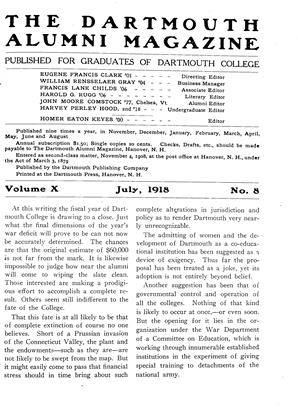Composition and Literature, by EUGENE R. MUSGROVE '05. New York: Longmans, Green & Co.
Composition and Literature, by Eugene R. Musgrove, is an interesting combination, in one volume, of materials that are usually put into two. The book aims to treat English composition in its various phases, and present, in addition, an abstract of English and American literature. Too often the student comes to the end of his secondary school training without being made to realize that there is any particularly vital connection between English literature and the language in which it is written. He is carried through a preliminary study of grammar and receives practice in reading; in his high school or preparatory school he devotes a certain number of hours a week to the study of certain accepted works of literature and recites upon them at different hours, and often to different teachers, from those employed in his composition work. The whole trend of the teaching is to present composition and literature as disjoined and unrelated subjects.
Consequently any text-book that by its mere arrangement tends to impress the opposite upon the student's mind serves a useful purpose. The usefulness of Mr. Musgrove's book, however, does not end there. Statement that aims always to be concise, a wealth of illustrative material drawn from pupils' work and contemporary newspapers and magazines as well as from the more classical fields, wide use of typical college entrance examination topics, and constant endeavor to connect the various portions of the work by means of cross-reference distinguish the book as a whole. Into a relatively small space the author has contrived to pack an astonishing amount of material and has included matter new to most text-books of secondary school English, but, in the light of the theory of the book, unmistakably appropriate. A system of parliamentary procedure for use in classroom discussion, a valuable treatment of the technique of examinations, a chapter on Oral English, a simple exposition of the theory of poetry, are features that many schools can make good use of. The author above all things the need of interesting the pupil, and keeps this need constantly in mind.
Mr. Musgrove's endeavor to obtain condensation in his text has carried him too far in some portions of his book and led him to sacrifice clearness for compactness. The medium between the two is always difficult to strike; if one must err it is better to err as Mr. Musgrove occasionally does. A good teacher can always elaborate on a text when the hint is given him, while no one is more to be pitied than a pupil condemned to grope among a tangle of words for an essential idea.
The typography of the book is excellent.
The May 11th issue of the All-StoryWeekly contains "The Devil's Violin," by Ben Ames Williams, 1910.
"Educational Tinkering," by William D. Parkinson 1878, appeared in the Boston Sunday Herald for May 19.
The Classical Journal for May 18 contains "The Classics and the Greek Writers of the Early Church: Saint Basil," by Roy J. Deferrari 1912.
The Gloom of the Museum and TheNew Museum, by John Cotton Dana 1878 have just appeared as publications in the New Museum series.
Harold O. Rugg '08 and J. R. Clark are authors of "Scientific Method in the Reconstruction of Ninth-Grade Mathematics; a Complete Report of the Investigation of the Illinois 'Committee on Standardization of Ninth Grade Mathematics." This report is published by the University of Chicago.
Dr. Guy G. Fernald '93 is the author of "Maine's Mentally Defective and Maine and Her Dependents," "Shell Shock" or "War Shock," and "The Problem of the Diminution of Dependency." These articles have been published as Bulletins 1-5 of the Maine Commission on Provision for the Feebleminded.
 View Full Issue
View Full Issue
More From This Issue
Books
-
 Books
BooksALUMNI NOTES
MAY 1927 -
 Books
BooksTHE MOUNTAIN MEN.
MARCH 1964 By ALLEN R. FOLEY '20 -
 Books
BooksPROSE & POETRY OF MODERN FRANCE.
NOVEMBER 1964 By DAVID SICES '54 -
 Books
BooksRaces, Nations and Classes.
March 1925 By MALCOLM M. WILLEY -
 Books
BooksValedictory
DECEMBER 1981 By Robert H. Ross '38 -
 Books
BooksA COMPARATIVE STUDY OF BASQUE AND GREEK VOCABULARIES
OCTOBER 1958 By ROYAL C. NEMIAH








